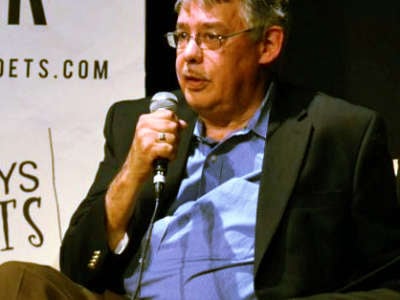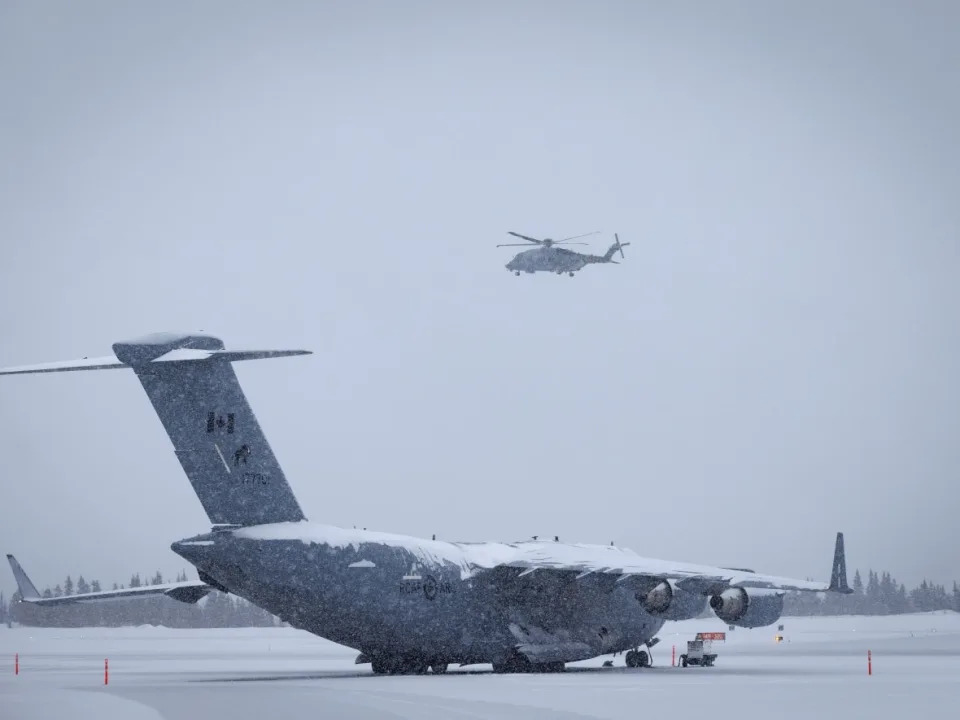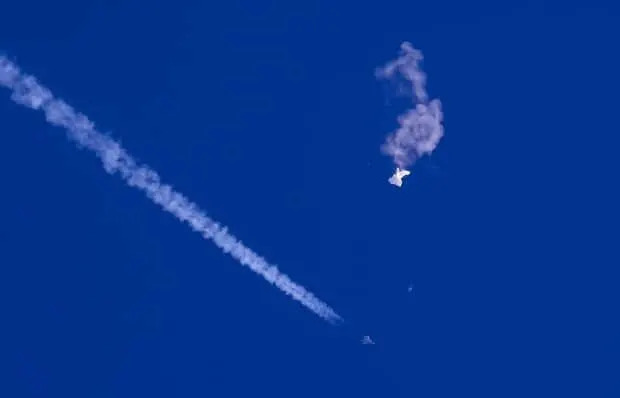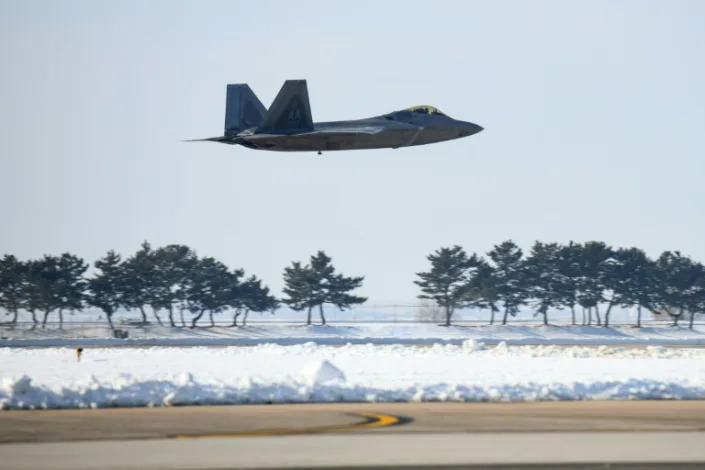DEMOCRACY NOW!
US-China Tensions Escalate Amid Mutual Accusations of Surveillance
TRANSCRIPT
This is a rush transcript. Copy may not be in its final form.
AMY GOODMAN: We’re beginning today’s show looking at U.S.-China relations, 10 days after the U.S. shot down a suspected high-altitude Chinese surveillance balloon off the coast of South Carolina, after it had flown across Alaska, across Canada, and then across the United States. According to the U.S. military’s Northern Command, divers’ crews have been able to recover “significant debris” from the site, including sensor and electronic pieces from the structure.
Meanwhile, China has accused the U.S. of flying surveillance balloons into Chinese airspace at least 10 times over the past year, a claim the Biden administration has rejected. This is Chinese Foreign Ministry spokesperson Wang Wenbin.
WANG WENBIN: [translated] The illegal intrusion of airspace of other countries by U.S. balloons is also commonplace. Just since last year, the U.S.’s high-altitude balloons illegally entered Chinese airspace more than 10 times without the approval of the relevant Chinese authorities. The first thing the U.S. side should do is start with a clean slate, undergo some self-reflection, instead of smearing and accusing China.
AMY GOODMAN: In recent days, the U.S. has also shot down three additional objects flying at a lower altitude — one in northern Alaska, one over Lake Huron and one over central Yukon in Canada. The Biden administration has said little about the three objects, leading to rampant speculation. On Sunday, a reporter asked the NORAD commander — that’s the Air Force General Glen VanHerck — if the military has ruled out aliens or extraterrestrials. VanHerck responded by saying, “I haven’t ruled out anything at this point.” That led to the White House briefing on Monday where they said, “No indication of aliens or extraterrestrial activity.” Democratic Congressmember Jim Himes appeared on Meet the Press Sunday and called on the Biden administration to release more information.
REP. JIM HIMES: You know, the one thing, Chuck, that is troubling me here, I sort of see a pattern. As I looked at social media this morning, you know, all of a sudden, massive speculation about alien invasions and, you know, additional Chinese action —
CHUCK TODD: Yeah.
REP. JIM HIMES: — or Russian action. In the absence of information, people’s anxiety leads them into a potentially destructive area. So I do hope that very soon the administration has a lot more information for all of us on what’s going on.
AMY GOODMAN: U.S. senators are scheduled to receive a classified briefing today.
We’re joined now by Jake Werner, a historian of modern China, research fellow at the Quincy Institute for Responsible Statecraft. His new for The Nation with Bill Hartung is headlined “War With China Is Preventable, Not Inevitable.”
Welcome to Democracy Now!, Jake. I mean, what we are seeing in this last week, the — you know, you have these jet fighter planes that are taking down, exploding these surveillance objects in the sky. Even people like Congressmember Himes are saying, “What are we doing?” They not only don’t pose military threat, they don’t pose a civilian threat. Like, when was the last time a balloon took down a civilian plane? But the reason this is all happening is because of this increased anti-China fervor in the United States. Can you just talk about everything in context?
JAKE WERNER: Yeah. What this really shows is that as the sense of threat around China increases, then American leaders are looking for threats everywhere, in places that they weren’t looking before, and they’re finding things that they hadn’t paid any attention to and identifying those as potential threats and taking preemptive — excuse me — preemptive action on them. So now we’re shooting down objects that previously would have been ignored, that previously the surveillance capabilities of the United States would have filtered out. With the intrusion of the Chinese spy balloon into U.S. airspace, now people are looking for threats everywhere. And that’s not just around surveillance. It’s not just around balloons or unidentified flying objects. It’s around everything. People are seeing threats from China everywhere they go, and responding in ways that will often be very counterproductive.
JUAN GONZÁLEZ: And, Jake Werner, why do you think this is happening? I mean, this whole thing about the balloons, when so many governments have satellite systems that are doing reconnaissance on an almost daily basis of countries around the world, why this sudden fixation on balloons has arisen?
JAKE WERNER: I think — I think it’s actually unwanted on the part of the Biden administration. They were looking to improve the relationship with China, as the Chinese government was looking to improve the relationship with the United States. Unfortunately, the wandering of this balloon into the public consciousness gave space to people who are looking — who are looking very hard for places to attack both the administration and China on in U.S. politics. That gave them an opening, and there was just a massive kind of freak-out around the balloon.
But you’re right: Surveillance is something that major countries do to each other on an everyday basis. It’s one of the most banal facts of international relations. The U.S. is spying on China. China is spying on the United States. The U.S. is spying on allies even. There was a scandal less than 10 years ago about the U.S. spying on the chancellor of Germany, Merkel. So this is something that is just a part of international relations. It can be healthy, because if major countries know what they’re doing, there is less room for miscalculation when it comes to tension and conflict. That doesn’t mean that countries shouldn’t take prudent steps to guard against it, but it really is all part of the game, and it shouldn’t be — it shouldn’t be the occasion for massive overreaction or for demonizing other countries around. And that goes for China, as well. Of course, China is sort of hitting back at the United States, but this is something that the United States — as everybody knows, the United States has been spying on China for many years and is doing so probably more effectively with satellite surveillance than with balloons.
So, I think the important thing here is to not lose sight of how crucial it is that the two most powerful countries in the world avoid a trajectory towards really serious conflict, that they were on, and that the meeting between Xi Jinping and Joe Biden last November seemed to give a respite from that. It’s important to return to that possibility of cooling tensions.
JUAN GONZÁLEZ: But you say that President Biden is committed to trying to tamp down conflicts between the United States and China, but yet, at the same time, he is remaining extremely ambiguous over the long-standing One China policy of the United States. Could you talk about how the Biden administration has been dealing with the issue of Taiwan as a sore point in U.S.-China relations?
JAKE WERNER: Yeah.
JUAN GONZÁLEZ: And what should be done by the administration?
JAKE WERNER: Yeah, on Taiwan, and on a lot of issues, honestly, there’s a bit of a contradiction within the administration, I think. On the one part, they genuinely want to avoid conflict with China. On the other hand, they increasingly are pursuing a policy path that is almost guaranteed to create conflict with China.
The most explosive potential flashpoint is around Taiwan. Taiwan is — the claim that mainland China makes on Taiwan is a bedrock part of Chinese nationalism. The Chinese government will not give it up, and it will go to war if it feels that Taiwan is being permanently separated from China. The United States definitely does not want that. But at the same time, as distrust has really come to characterize everything about the relationship, the U.S. is pursuing a one-sided deterrence policy against China, trying to convince China not to make any aggressive moves towards Taiwan on the basis of simply strengthening the military deterrent on the U.S. side and the Taiwanese side and allied countries in the region.
But, quite predictably, this is giving the Chinese leadership the sense that they are increasingly encircled and besieged by the most powerful country in the world and the rest of the most powerful countries in the world, that all the major powers are kind of ganging up on China. And increasingly, China is pursuing its own deterrence measures aimed to convince the United States and its allies not to infringe Chinese interests. And this is leading to a kind of escalatory spiral, where both sides feel like they are looking out for their own security, they’re both trying to prevent the other side from taking aggressive actions, and the result is to exacerbate nationalism on both sides, exacerbate distrust on both sides, and lead to a militarization of the relationship that eventually, if the trajectory is not changed, eventually will likely lead to major conflict.
AMY GOODMAN: I mean, it is frightening when you see this kind of monolithic force pushing toward militarization against China. You’ve got the Republicans and Democrats essentially agreeing. You know, the Republicans are saying, “Shoot down that balloon,” and then the Biden administration and Democrats are in agreement. And the media — and I’m not just talking Fox, I’m talking CNN, MSNBC — couldn’t be more aggressive when coming to dealing with China and these, for example, spy satellites, when you have China saying, “Hey, you know, we’ve been watching your spy satellites over us, for the last year at least 10 of them, and we haven’t raised this as an issue.” But I wanted to ask: What about the corporate view of this? I mean, going back to last year, bilateral trade between the U.S. and China reaches a record-breaking $690 billion. I mean, you can’t have places like Apple and other corporations that use China for its cheap labor wanting the U.S. to go to war with China.
JAKE WERNER: No, they don’t. They certainly don’t want conflict. They also don’t want to be cut out of the Chinese market, which is one of the fastest-growing markets in the world. There’s a lot of profits to be made in the China market. There are a lot of cost advantages to sourcing production from China. A lot of manufacturers in the United States rely on low-cost Chinese imports to remain competitive. So, the business community as a whole is very uneasy about this.
But they also have — they have really gotten a clear signal from policymakers in D.C. that if they stand up and say something, that they are going to become the targets for withering attack from people who are charging them with being unpatriotic, with selling out the country. And so, what they’re doing instead is keeping this very quiet, sort of indicating in private, “We would prefer that the restriction — we understand the need for restrictions, but the restrictions shouldn’t be too tight.”
So they’re trying to kind of make movement on the edges rather than trying to change the overall foundation of the relationship. The problem with that approach is, of course, that as the relationship deteriorates, deteriorates, deteriorates, if you’re just trying to make adjustments on the margins, you’re not doing anything to the overall trajectory.
And the political logic of conflict in D.C. right now is so powerful. It’s so easy to make hay over the issue by accusing your opponent of being weak on China, and there is no political incentive for people in D.C. to stand up and say, “We don’t want international conflict.”
It’s important for the two most powerful countries in the world to have a constructive relationship and work on these hugely important issues of shared concern between the two countries, between the two peoples. Right now the forces that have an interest in cooperation between the U.S. and China are not articulating that interest effectively in D.C., and so people don’t feel like there’s a political upside to pushing back against the incitement of international conflict that is really dominant right now.
AMY GOODMAN: Well, Jake Werner, we want to thank you for being with us, historian of modern China, research fellow at the Quincy Institute for Responsible Statecraft. We’ll link to your in The Nation with Bill Hartung, “War With China Is Preventable, Not Inevitable.”
In our next segment, we’re staying with China. We’re going to speak with David Vine, author of Base Nation: How U.S. Military Bases Abroad Harm America and the World. Stay with us.
(break)
AMY GOODMAN: “War,” performed by Edwin Starr. The protest anthem was written by Motown legend Barrett Strong, who died in January at the age of 81.

AMY GOODMAN
Amy Goodman is the host and executive producer of Democracy Now!, a national, daily, independent, award-winning news program airing on more than 1,100 public television and radio stations worldwide. Time Magazine named Democracy Now! its “Pick of the Podcasts,” along with NBC’s “Meet the Press.”

JUAN GONZÁLEZ
Juan González co-hosts Democracy Now! with Amy Goodman. González has been a professional journalist for more than 30 years and a staff columnist at the New York Daily News since 1987. He is a two-time recipient of the George Polk Award.






:quality(70)/cloudfront-eu-central-1.images.arcpublishing.com/thenational/EWUZ2SDLHLWAF6TTDW4IAVSHPM.jpg)
:quality(70)/s3.amazonaws.com/arc-authors/thenational/9e2159fa-e4db-4215-b498-6b3607b75bee.png)
:quality(70)/cloudfront-eu-central-1.images.arcpublishing.com/thenational/XSQQXLSMU4F6AGOGBURIPT4NTQ.jpg)




